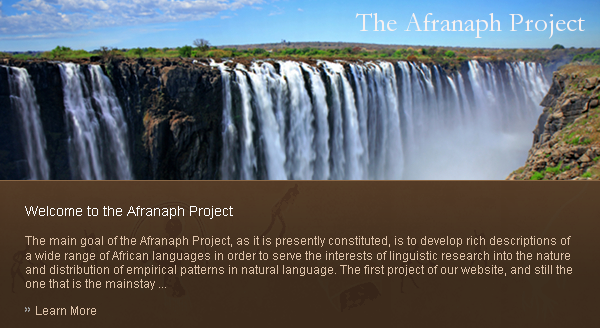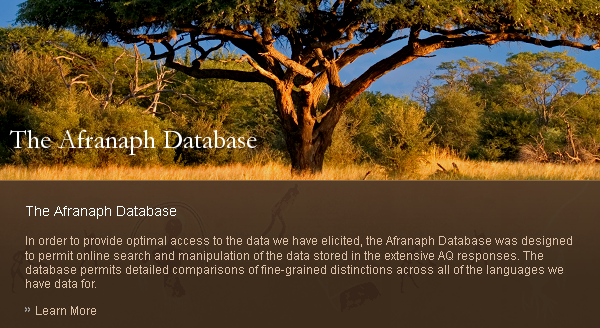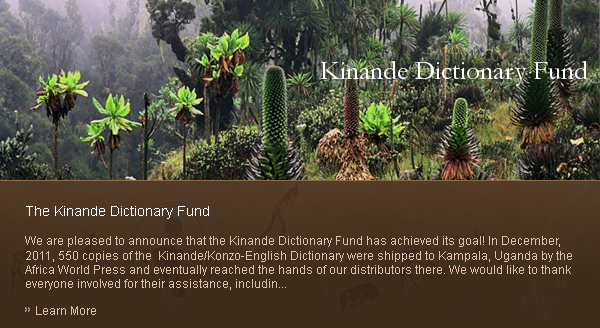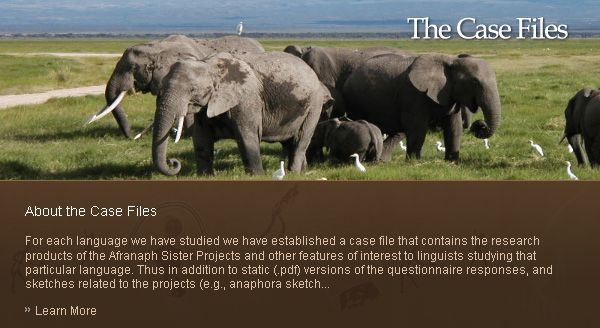Homepage Feature
Vicki Carstens is Professor and Chair of Linguistics at Southern Illinois University, Carbondale. Her research area is generativist syntax, with a focus on African languages. Much of her work explores the theoretical implications of agreement and word order phenomena within the framework of Noam Chomsky's Minimalist framework. Her articles have appeared in the journals Linguistic Inquiry, Syntax, The Linguistic Review, and Natural Language and Linguistic Theory. (See published works.)
Michael Diercks is an Associate Professor of Linguistics and Cognitive Science at Pomona College. He received his Ph.D. from Georgetown University in 2010. His main research interests include syntactic and morphological theory and the syntax and morphosyntax of languages of East Africa, mainly on the Luyia subgroup of Bantu languages. He has worked on the empirical domains of inversion constructions, object marking, complementizer agreement, and hyper-raising constructions, addressing theoretical questions about agreement, noun phrase licensing, and locality in syntax. His research has been published in venues like Natural Language and Linguistic Theory, Lingua, Linguistic Inquiry, and Studies in African Linguistics.
Claire Halpert is an Associate Professor of Linguistics at the University of Minnesota, Twin Cities, where she has worked since receiving her Ph.D. from MIT in 2012. Her research has focused on topics including case, agreement, A-movement, counterfactuality, and clausal complementation. Professor Halpert has explored these topics primarily through the lens of her site-based research on the Bantu language Zulu; she has been working with Zulu speakers in KwaZulu-Natal, South Africa, since 2006. Since 2011, her work has focused on the variety of Zulu spoken by speakers in Durban, South Africa. She was a Visiting Scholar at the University of KwaZulu-Natal in 2011, 2012, and 2015 and was an instructor at the African Linguistics School in 2011 and 2013.
Ruth Kramer is Associate Professor of Linguistics at Georgetown University. Her research concerns syntax, morphology, and the relationship between them, including topics like gender, number, syncretisms, clitic doubling, and agreement. She conducts research almost entirely on languages from the Afroasiatic language family, with a special focus on Amharic (Ethiosemitic). She published a monograph The Morphosyntax of Gender in 2015 with Oxford University Press, and her publications have appeared in such journals as Natural Language and Linguistic Theory, Linguistic Inquiry, Syntax, Language and Linguistics Compass, and The Journal of Afroasiatic Languages. She received her Ph.D. in 2009 from the University of California, Santa Cruz, and she has been Associate Director of Afroasiatic Languages at Afranaph since 2012.
Justine Mukhwana Sikuku is a Senior Lecturer in the department of linguistics and Foreign Languages at Moi University, Kenya. He received his Ph.D. from The University of Nairobi in 2011. Between August and November 2011, he was a post-doctoral associate in the department of linguistics at Rutgers University. His research interests are in syntax and morphology, particularly in the nature of syntactic anaphora of African languages, as evidenced by his dissertation on the nature of anaphoric relations in Lubukusu. He is also the native speaker consultant on Lubukusu for the Afranaph project, and the Afranaph Sister Projects.
Jenneke van der Wal is a University Lecturer at the Leiden University Centre for Linguistics, and project leader of the NWO Vidi project 'Bantu Syntax and Information Structure .' After obtaining her Ph.D. degree at the same institute in 2009, she worked on grammaticalisation at the Royal Museum for Central Africa (Belgium), was part of the ERC project ‘Rethinking Comparative Syntax‘ at the University of Cambridge, and taught at Harvard University. Her research combines finding new data on Bantu languages with developing theories on the interface between syntax and information structure.
Afranaph Project funded for 2023
As the last three-year NSF grant comes to a close in August, 2022, surplus funding will still make possible additional support through August 2023. If there is no new funding at that time, Afranaph will continue its online presence indefinitely, but operations and new ventures will be contingent on additional monies. The basic assets of Afranaph will be unaffected regardless, since the website and the database are on commercial servers for a relatively small sum per year that is easily obtained. That means that everything on the site will still be available for new research and individual researchers can still seek to develop new data and collaborations with those consultants who are willing to be involved.
Board of Directors expands
Four new members have joined the Board of Directors in the last two years. They are Mark Baker, Philip Ngessimo Mutaka, Patricia Schneider-Zioga and Harold Torrence. The Board will be charting the future of the Afranaph Project for the next several years.
New resources now online or soon to be
In 2021, a number of new data resources were developed by Afranaph despite a variety of obstacles special to the pandemic and specific to the PI. Several data sets were completed with enough follow-up to have been entered into the database including Oromo (from the DPPQR, Tamam Youssef, consultant) and data from Muyang AQR (Theodore Bebey, consultant). New versions of the Makaa AQR and CCQR were posted this year. The OMQR was designed by Michael Diercks was completed and posted this year on our “Become a Consultant” page. A new Case file was opened for Setswana with new data entered this year pursuant to joint work on complementizer agreement in Setswana and Ikalanga by Ken Safir and Rose Letsholo. Metadata in the database for a number of files was entered for the new data and some of it was revised by the Project Director.
A number of new resources developed in 2021 are soon to appear on our site. These include the first OMQR which was completed for Changana (David Langa, consultant) and which will soon be posted. A new case file will be opened for Tupuri, an AQR completed (in French) by our consultant Djakode Noumga will be posted as a .pdf and the data from the AQR will be entered into the database soon. A 100 page Grammar Sketch of Muyang by Theodore Bebey is undergoing final editing and will appear in the Muyang case file. A new case file has been opened for Baatonum (AQR underway, Deen Mamadou-Yacoubou, consultant). New data for existing case files for Kinande, Ibibio and Setswana have been collected and await final editing. These data will be posted this year.
Afranaph Project funded for 2023
As the last three-year NSF grant comes to a close in August, 2022, surplus funding will still make possible additional support through August 2023. If there is no new funding at that time, Afranaph will continue its online presence indefinitely, but operations and new ventures will be contingent on additional monies. The basic assets of Afranaph will be unaffected regardless, since the website and the database are on commercial servers for a relatively small sum per year that is easily obtained. That means that everything on the site will still be available for new research and individual researchers can still seek to develop new data and collaborations with those consultants who are willing to be involved.
Board of Directors expands
Four new members have joined the Board of Directors in the last two years. They are Mark Baker, Philip Ngessimo Mutaka, Patricia Schneider-Zioga and Harold Torrence. The Board will be charting the future of the Afranaph Project for the next several years.
New resources now online or soon to be
In 2021, a number of new data resources were developed by Afranaph despite a variety of obstacles special to the pandemic and specific to the PI. Several data sets were completed with enough follow-up to have been entered into the database including Oromo (from the DPPQR, Tamam Youssef, consultant) and data from Muyang AQR (Theodore Bebey, consultant). New versions of the Makaa AQR and CCQR were posted this year. The OMQR was designed by Michael Diercks was completed and posted this year on our “Become a Consultant” page. A new Case file was opened for Setswana with new data entered this year pursuant to joint work on complementizer agreement in Setswana and Ikalanga by Ken Safir and Rose Letsholo. Metadata in the database for a number of files was entered for the new data and some of it was revised by the Project Director.
A number of new resources developed in 2021 are soon to appear on our site. These include the first OMQR which was completed for Changana (David Langa, consultant) and which will soon be posted. A new case file will be opened for Tupuri, an AQR completed (in French) by our consultant Djakode Noumga will be posted as a .pdf and the data from the AQR will be entered into the database soon. A 100 page Grammar Sketch of Muyang by Theodore Bebey is undergoing final editing and will appear in the Muyang case file. A new case file has been opened for Baatonum (AQR underway, Deen Mamadou-Yacoubou, consultant). New data for existing case files for Kinande, Ibibio and Setswana have been collected and await final editing. These data will be posted this year.
Afranaph Project receives new 3 year grant
The NSF has awarded Ken Safir, as Principal Investigator, a three-year grant for his proposal entitled “Exploring boundary conditions on the theory of agreement through the comparative study of African languages”. The new grant begins September 1, 2018. See the Project Summary and the Project Description for NSF BCS-1829122 for details. The Project description includes a partial listing of the achievements of Afranaph over the last 15 years.
Afranaph Project forms Board of Directors
The Afranaph Project will now be governed by a Board of Directors to whom the Project Director will report. The role of the Board will be to decide new directions for Afranaph research, funding and work flow and the Board will also be responsible for choosing the Project Director. Bylaws for governance of Afranaph are currently being drafted.
The new Board has been appointed by current Project Director, Ken Safir, but future changes to the Board, including its size and composition, will be decided by the Board itself. The inaugural Board members are Prof. Vicki Carstens, U. of Southern Illinois, Prof. Michael Diercks, Pomona College, Prof. Claire Halpert, University of Minnesota, Prof. Ruth Kramer, Georgetown University, Prof. Justine Sikuku, Moi University and Prof. Jenneke van der Wal, Leiden University.
Next Afranaph Project Development Workshop (APDW3)
APDW3 is taking place at Georgetown University on December 13-14. No conference fee, everyone welcome.
See APDW3 page for more information
The Director’s Blog
August, 2018
After 15 years of directing Afranaph, it may seem a bit late in the day for me to begin a blog about our project, but it is precisely because I am in the last years of directing Afranaph that it seems time to reflect on where we are and what the future of the project should be.
When the project began in 2003, it was intended as a temporary funding mechanism to support African visitors to the joint ACAL and WOCAL that took place at Rutgers in 2003 (at the behest of my colleague, Prof Akin Akinlabi, a driving force behind so many initiatives and organizations in African linguistics). I knew almost nothing about African linguistics, but since one of my specialties was the crosslinguistic comparison of anaphora systems, I thought we might pay conference participants for filling out a questionnaire designed to elicit anaphora facts. I would follow up with them online afterward and then I would post the results on a public website. It was also a way of supporting one of our graduate students, Oluseye Adesola, who was the first research assistant (RA) on the project. I thought it was going to be “one and done”.
However, the idea wouldn’t die. Seye convinced me that the project could be very useful to the African linguist-consultants in particular, many of whom felt isolated from participation in the wider community of linguists. Our department needed the income to take pressure off our graduate student funding. NSF liked the idea it was using new advances in technology to build an online research community focused on advancing our understanding by targeting very specific issues based on data from understudied languages. A number of our consultants were enthusiastic. It was put to me that I should not let it die. I was in a position to make it work, but it was up to me to write the grant and see it through to actually get it done. Well, I did, and after a few years…yes, a few years, I wasn’t sorry. There is a reason I am talking about this now.
The NSF grant that we have just secured will be the last one that I direct because I shall be retiring at Rutgers soon after the grant expires. We need to determine whether there is sufficient will and need to continue Afranaph as an ongoing enterprise, or whether it should remain online as a resource, but without growing. To determine the need for an ongoing project, we want input, constructive, testimonial, or even negative, from the Afranaph community, including active contributors and those who use our site and database. To determine the will, we need to identify the next generation of leaders for the project who have a vision for what the project can be, the who have the willingness to take on the responsibilities of running the site, and who have the access to resources, funding and infrastructure in particular, that permit us to support all of our activities. Finding such leadership is the challenge we face in the next several years.
As announced on our events page, I have appointed a Board of Directors will plan for, and hopefully be the kernel of, our new leadership team. I am confident that they will find a better formula for Afranaph in the future, one that spreads responsibility for Afranaph functions across a wider set of venues.
If you are one of the few people who actually reads this blog, I am interested in your opinion of our project as it is now and your ideas for what it could be. You can write to me at This email address is being protected from spambots. You need JavaScript enabled to view it.. I need your feedback, which I will pass on to the Board, and I may end up discussing it in this space.
I do not intend, however, for the blog to become just an internal newsletter. Future entries will be about the experience of doing Afranaph research, the research itself, and the research relationships that have made it so much fun.






